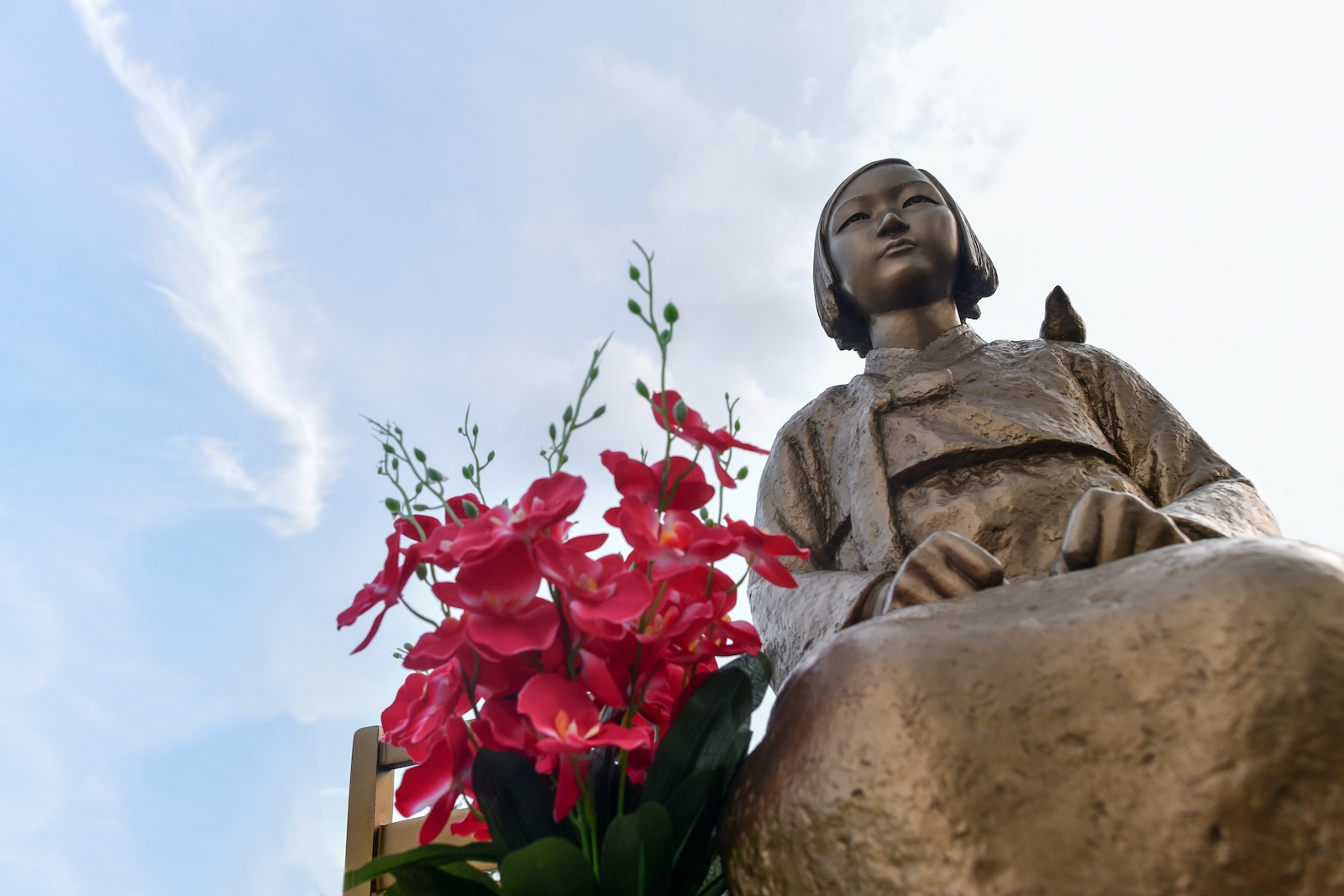
‘Comfort Women’ Issue Continues to Sour Japan-Korea Relations
Following the most recent missile test by North Korea, there is a renewed level of pressure on Washington’s allies in the region to present a united front.
Unfortunately, some appear to be living entirely in another reality.
Just a week previous to Kim Jong-Un’s most recent provocation, Chung Eui-yong, South Korea’s foreign minister, was telling the media that his government had “effectively” come to an agreement with Washington on an end of war declaration with no strings attached.
This completely undeserved concession to Pyongyang has been vigorously opposed by members of Congress, including Korean-American Rep. Young Kim (R-CA) and many others. Yet, hours after the provocative missile test, President Moon Jae-in continued to harp on the need to pursue dialogue.
Washington’s ability to contain North Korean aggression is also seriously hampered by South Korea’s seemingly intractable grievances with Japan, which have significantly worsened. This represents a serious obstacle to a “united front.”
The stability of the trilateral alliance is key to U.S. national security, both in dealing with Pyongyang and in buffeting expanding Chinese aggression in the region. Without a functional South Korea-Japan relationship, the integrity of the trilateral alliance is at risk – and our adversaries know it.
At the heart of the dispute is South Korea’s enduring sense of victimhood dating back to the Second World War, including airing ongoing historical grievances over ‘comfort women’ and labor claims. Opportunists continue to stoke tensions over these matters with court cases and civic group activism.
These tensions, however, are largely artificial and unnecessary. South Korea and Japan are both modern, industrialized, high-tech economies with significant and compatible trade interests. As Northeast Asia’s two largest democracies, they have profound mutual national security interests, overlapping alliance preferences, and more cultural affinity than they may realize, from K-pop to Pokémon.
Countless other countries have reconciled after wars and occupations. Germany has good relations with France, the UK, the U.S., and even Israel. The U.S. maintains a robust partnership with Vietnam, and many liberated nations worldwide have developed positive relations with past colonial states.
But for a small but particularly vocal group of activists, there is a determination to keep South Korea stuck in the past. This should become a point of pressure for Washington to secure the stability of the trilateral alliance.
One problem is that on many of the core claims relating to the historical disputes, South Korea has repeatedly broken promises and played loose with the truth. On the issue of comfort women, referring to women in wartime brothels, South Korea claims that Japan has never apologized.
But despite the unpleasantness of this topic, the fact is that Japan has already apologized, repeatedly, regarding what happened during that period of history.
The apologies go as far back as 1992, when Japanese Prime Minister Kiichi Miyazawa visited Korea and stated his apologies on several occasions. Statements by Chief Cabinet Secretaries Koichi Kato in 1992 and Yohei Kono in 1993 were followed with the disclosure of the results of a study of the issue conducted by the government of Japan.
More recently, six more Japanese prime ministers have issued apologies. In 2015, Shinzo Abe, Japan’s former prime minister, expressed his sincere apologies and remorse for the “incurable physical and psychological wounds” suffered by comfort women.
Despite all of this, the South Korean government has made matters worse by indirectly sponsoring the building of numerous comfort women memorials on U.S. soil. These memorials are an obvious further provocation and insult to Japan. The activists building them say they are doing it for “historical justice” and “universal women’s rights.” But is that really the case?
The problem is not that these South Korean and Korean American activist groups want to honor comfort women. The problem is that they have been strictly selective in their empathy, increasing anti-Japanese sentiment for their political gain back in Seoul.
Many in Japan point out that these same activist groups have not made any outreach to include Japanese survivors of the comfort stations, who made up the vast majority of comfort women. The fact is that activists pursuing the global memorials have been strictly selective of the nationalities of the victims that they would honor, because the recognition of Japanese suffering would complicate the narrative.
Further, the human rights posturing of these groups is not credible, given their silence over significant atrocities and crimes against humanity committed by the South Korean military in Vietnam.
For example, Newsweek in 2000 published a series of investigative reports that “uncovered a pattern of atrocities survivors say were perpetrated by South Korean soldiers” between 1965 and 1973. The crimes reported by survivors included massacres, torture, and mass rape, which left behind an entire generation of racially mixed children known as the Lai-Dai-Han.
Newsweek cites a study conducted in the early 1970s by two American former Peace Corps volunteers. They documented 45 incidents in which Korean troops acted with shocking levels of brutality, including “beheading, disemboweling, and rape ending in murder.” They observed that, “in most of the large massacres the people were not killed until they were rounded up into groups.”
Even today, efforts by Vietnamese survivors to obtain justice, official apologies, or some form of reparations are still being studiously spurned by South Korea, where the subject of military atrocities is strictly taboo. Moreover, no monuments to honor this group of victims have been constructed anywhere in the U.S.
Lastly, it is deeply problematic that these comfort women groups have ignored the suffering and exploitation of South Korean women who worked as prostitutes in the so-called “camptowns” serving the U.S. military in the postwar period. In 2017, one group of victims won a court case in which the South Korean government was found responsible for illegal detentions of prostitutes. The judge, in that case, described the plaintiffs as “comfort women for the U.S. military.”
According to The New York Times, the plaintiffs had encouraged that comparison, arguing that it was hypocritical for South Korea to condemn Japan for its historical wrongdoings while not acknowledging its own role in ensuring that foreign soldiers had access to Korean prostitutes.
So when these monuments are proposed in U.S. cities, it is not to honor anything about “universal” human rights. It is instead a selective framing of history designed to increase anti-Japanese sentiment and meet a contemporary nationalist political goal. These actions, which imply a motivation focused on hatred of all things Japanese, should have no place in America’s public square.

